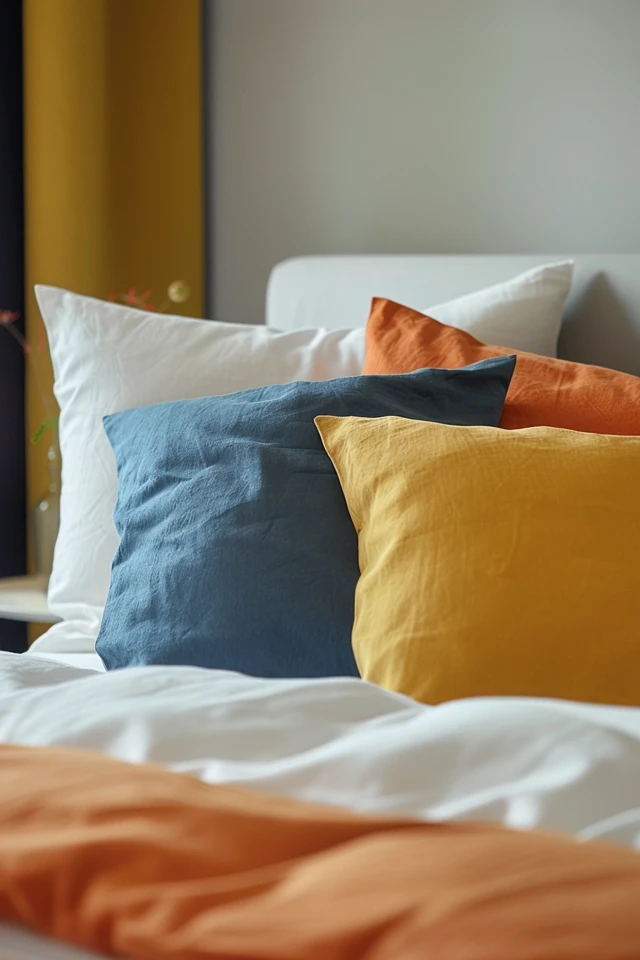Keeping your sheets and pillowcases clean is crucial for maintaining a hygienic and comfortable sleep environment. Over time, bedding can accumulate dead skin cells, dust mites, oils, makeup, and other products, which can lead to discomfort, skin rashes, and unpleasant odors.
Experts recommend washing your sheets every other week, although it’s best to change them weekly. However, certain factors such as allergies, sensitive skin, sweating, sleeping with pets, eating in bed, or having infections or open wounds that come into contact with your bedding may require more frequent washing.
To properly machine-wash your sheets, you should wash the fitted and flat sheets together with the pillowcases. Heavier items like comforters should be washed separately. Before washing, check for any stains and pre-treat them to ensure they come out as clean as possible.
When selecting a detergent, be sure to use one that is suitable for your sheets. Adjust the washing machine settings according to the recommended temperature, and make sure to thoroughly dry your sheets before making your bed.
To reduce the frequency of washing your sheets, it’s helpful to avoid eating in bed, refrain from sleeping with your pets, and make it a habit to shower before getting into bed.
Regularly washing your sheets and pillowcases will not only help you sleep better but also contribute to a cleaner and more relaxing environment for a good night’s rest.

Key Takeaways:
- Wash your sheets every other week, but it’s best to change them weekly for optimal hygiene.
- Consider more frequent washing if you have allergies, sensitive skin, or certain habits.
- Wash the fitted and flat sheets together with the pillowcases.
- Pre-treat stains before washing to ensure they come out clean.
- Use an appropriate detergent and adjust the washing machine settings accordingly.
- Thoroughly dry your sheets before making your bed.
- Avoid eating in bed and sleeping with pets to reduce the need for frequent sheet washing.
How Often Should You Wash Bed Sheets and Pillows?
The frequency at which you should wash your bed sheets and pillows depends on various factors, including your personal habits and any underlying health conditions. While the common rule of thumb is to wash sheets every other week, sleep experts recommend changing them every week for optimal hygiene.
Sweat, dead skin, dust mites, and allergens can accumulate on sheets, which may cause allergies, skin irritation, and respiratory problems. If you have allergies, sensitive skin, or respiratory issues, it is recommended to wash your sheets more often.

Stains should be treated before washing, using appropriate stain removers or home remedies.
Washing temperature and cycle type should be chosen based on the fabric and care label instructions.
Note:
If you have an infection or open wound that touches the bedding, it is important to wash your sheets more frequently to prevent the spread of bacteria and maintain cleanliness.
Drying your sheets completely is important to prevent odors and mildew.
For pillows, check the care label for washing instructions and consider using a gentle cycle or handwashing.
Regular washing of your bed sheets and pillows will help maintain a clean and healthy sleep environment.

Tips for Deep Cleaning Bed Sheets and Pillowcases
To ensure a thorough and deep clean of your bed sheets and pillowcases, follow these tips:
Treat stains before washing by using dedicated stain removers or home remedies. This will help remove stubborn stains and prevent them from setting in during the wash.
Lower water temperatures are recommended to prevent damage to the fabric. Using cold or warm water instead of hot water can help preserve the color and quality of your bedding.
When washing your pillowcases and duvet covers, consider turning them inside out. This simple step can help maintain the quality of the material and prevent shedding or color fading.
For effective cleaning and ease of organizing, it’s best to wash your bedding in separate loads. You can separate them by room or bedding type, such as washing sheets and pillowcases together, and heavier items like comforters separately.
If you prefer a hassle-free approach or want to achieve optimal results, you can consider using a professional laundry service. They can handle the pickup, delivery, and washing of your bedding, saving you time and effort.
By following these deep cleaning methods and taking proper care of your bed sheets and pillowcases, you can banish odors, brighten your sheets, and protect your investment in bedding for a clean and comfortable sleep environment.

